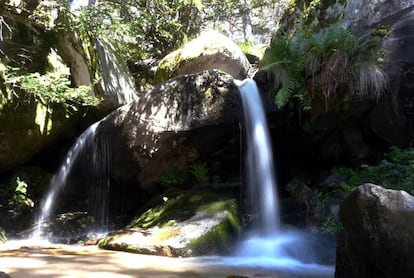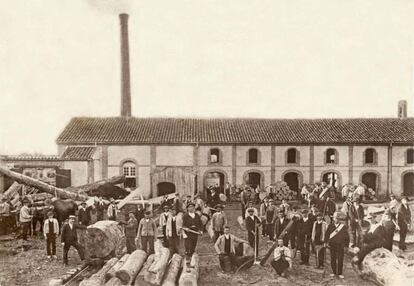How foreigners left their mark on Spain’s Guadarrama Mountain range
The Schmidt Trail, among others, tell the stories of travelers who explored the Spanish mountains
For centuries, Madrid’s mountains were a dark place. A natural border between the north and south of the Iberian Peninsula, neither invaders – Roman, Arab, Napoleonic French – nor kings nor Roman travelers could avoid crossing the Sierra Guadarrama mountains, which was once home to bandits and air so cold it was a known killer in the times of tuberculosis.

A hike of more than 12 hours separated Madrid residents in the 19th century from this remote area that still inspired fear in the popular imagination. The English traveler George Henry Borrow wrote in The Bible in Spain (1843) about “deep lagoons inhabited by monsters.” Initially it was foreigners, along with a few Spaniards, who made the dangerous mountain range fashionable in the 19th century: Norwegians, Germans and Swiss were pioneers in Spain of skiing and mountaineering, and who left named many of the best-known landmarks.
The Norwegian Knoll
It was foreigners, along with a few Spaniards, who made the mountain range fashionable
At a time when no Spaniard in his right mind had even thought about skiiing, Birgen Sörensen arrived in Madrid to take over his family’s timber business. Sörensen, who from Christania, in Norway, where the first modern European ski school was founded, began exploring the Sierra Guadarrama to commission a sawmill and instead found the perfect place to practice his passion. On the slope that descends from the “Bola del Mundo” peak to the mountain pass of Cotos, now known as the Norwegian Knoll (although few know why), he launched himself down on “rudimentary skis, stiff planks.”
“People were very surprised to see a man gliding the mountains in this way,” says journalist and publisher Ángel Sánchez Crespo, author of a history of the Sierra de Guadarrama, which credits Sörensen as the pioneer of skiing in Spain.
The skier then made friends with hikers, many of them linked to an educational association founded by Manuel Bartolomé Cossío, who, having read stories about Greenland, was fascinated by snow. Sörensen had skis made in Madrid, and in 1906, Manuel González de Amezúa founded the Twenty Club, which was the forerunner of the Spanish Alpine Club. "The Navacerrada Mountain, however, did not become a ski resort until the middle of the 20th century," says Sánchez Crespo. Sörensen died in 1910, at the age of 33, from typhoid.
The German Shower
This two-meter waterfall in the Fuenfría Valley, near Cercedilla, was a favorite spot for German mountaineering pioneers to cool off in the Madrid mountains. In 1902, when there were “only very few groups” in the mountain range, there was the “German group,” according to Bernaldo de Quirós, the founder of the Royal Alpine Society of Peñalara. These foreigners “did not leave written testimony of their sporting activities, which leads me to think of them as a group of pure sportsmen,” says writer Manuel Mollá-Ruiz Gómez.
They wore in shorts, which at that time people didn’t wear Sánchez Crespo, journalist
The group’s leader, Carlos Coppel, arrived in Madrid in the 1860s and “founded a watch factory on Fuencarral street, which was prestigious in its time,” says Gómez. "La Pedriza, a place practically unknown until the geologist Casiano de Prado explored it in the 1860s, followed later by some Germans," says Sánchez Crespo. “They were people who came in shorts, which at that time people didn’t wear, and they walked all over the Sierra. That’s what a lot of people here do not understand,” he says, drawing on literary and journalistic fragments of the time with “curious descriptions of the Germans, who must have seemed like enormous beasts... One, who had explored the Alps, went to Pedriza and got lost, because it is a labyrinth.”
The Devil’s Window
This rock formation in the shape of a window, located on the third of the Seven Peaks, where various members of the Peñalara Society, was where “The Twelve Friends” placed a plaque in 1919 in honor of one of their cofounders, Alberto Oettli, who had died a few months before.
On his journey to the steepest peaks in July of 1891, Oettli completed the first known ascent to the Seven Peaks ridge in the company of Arthur Jackson, a British diplomat. The plaque has long since disappeared.

The Schmidt Trail
The classic route that links the mountain passes of Navacerrada and Fuenfría, the two oldest trails atop the range, was created in 1926 by Eduardo Schmidt, the 13th member of the Royal Spanish Alpine Society of Peñalara). Schmidt was a pioneer of mountaineering and skiing in Spain, where he lived the last half of his life. He traced the route that bears his name when he visited the pass at Navacerrada in 1927.
In the final stretch of his life – he died in El Espinar, some 60 kilometers northwest of Madrid, in 1962 – the mountaineer spent a season in Trillo, a town in central Spain, where he met his wife Paquita. It was there that he was immortalized in Journey to Alcarria, by the Nobel literature laureate Camilo José Cela, who wrote: “at the entrance to the village there is a well kept house, all covered with flowers; In it lives a veteran climber called Schmidt, already old and retired, growing roses and carnations and working the orchard, [...] he was a famous mountaineer; In the Sierra Guadarrama and there is a road that bears his name.”
English version by Debora Almeida.
Tu suscripción se está usando en otro dispositivo
¿Quieres añadir otro usuario a tu suscripción?
Si continúas leyendo en este dispositivo, no se podrá leer en el otro.
FlechaTu suscripción se está usando en otro dispositivo y solo puedes acceder a EL PAÍS desde un dispositivo a la vez.
Si quieres compartir tu cuenta, cambia tu suscripción a la modalidad Premium, así podrás añadir otro usuario. Cada uno accederá con su propia cuenta de email, lo que os permitirá personalizar vuestra experiencia en EL PAÍS.
¿Tienes una suscripción de empresa? Accede aquí para contratar más cuentas.
En el caso de no saber quién está usando tu cuenta, te recomendamos cambiar tu contraseña aquí.
Si decides continuar compartiendo tu cuenta, este mensaje se mostrará en tu dispositivo y en el de la otra persona que está usando tu cuenta de forma indefinida, afectando a tu experiencia de lectura. Puedes consultar aquí los términos y condiciones de la suscripción digital.








































